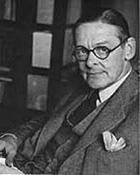Ash Wednesday Poem by Thomas Stearns Eliot
Ash Wednesday
The text of this poem could not be published because of Copyright laws.
after reading everyone's responses to Eliot's 'Ash Wednesday', i am pretty sure i can't sum it up or even attempt to say it any better....but i will try anyways. (e for effort, right?) okay, so hmm...being the non-religious person with no background on Christian beliefs or biblical references, i interpreted this poem as some sort of forgiveness type of ordeal. the narrator is praying that God, or some higher power forgives him for...sins, i guess. he really believes that pleaded to God and having the willingness to accept whatever punishment as accountability, shall ease his concience? why is he really pleading? for God's forgiveness or for his own self...because some of it sounds like pity, if you ask me-but i'm not quite sure. i could be interpreting this poem incorrectly, in that i'm seeing past any biblical reference or religious devotion and faith that may lie in this poem.
To add to what everyone else has been saying, I definitely think that this poem is one of repentance. The speaker of the poem, possibly from the point-of-view of Eliot himself, speaks about how he has lived a life without God for quite a long time and how he struggles as he continues to find himself and ultimately find salvage in God and Christianity. The speaker also writes as if he has committed some kind of tragic sin, so this poem could also be a plea for help, a plea for salvation. Throughout the poem, the speaker indirectly refers to himself as lowly, saying 'Lord I am not worthy/ Lord I am not worthy/ but speak the word only.' So although others, even himself, view him as a lowly creature, a heathen even (haha, that rhymes!) , God's grace - his 'word' - is what will save him from damnation. What I like about this poem is that it's very quotable. 'Teach us to care and not to care/Teach us to sit still/Even among these rocks, /Our peace in His will/ And even among these rocks'
This poem is very interesting yet i still dont understand nearly half of it. >< i could be partly because i dont understand poetry and have short attention span. But from what i could pick up, this poem is kind of sad because theres this man that feels that he is not good enough and loses hope in just about everything. He talks about his life story and relates it to a religious aspect. That about all i picked up so hopefully i can learn something from other people's comments :)
I think Eliot was trying to voice out different people's opinions on 'Salvation.' The sinner who thinks he can't repent, the sinner who allows himself the freedom of giving up wholly to God, and Jesus, without whom we would not be able to 'be made like we had never sinned before.' The level of sophistication that prevails throughout the whole poem, both in the wording and in the allusions, is stunning. Like 'The Wasteland, ' I don't think I'll ever be able to fully understand all of the different levels in this piece, but in it's complexity - like the complexity of human beings (Thanks MOC(k) CW) - it moves me. I can relate to the sinner who can't, and the sinner who did.
Dear Lord, this is both a poem and a great revelation of how my religion works. this is fantastic.
Eh, I like it a lot, but I think think the ending is lackluster.
Impeccable insight into religion/spiritual experience which, while seeking for the Light, is not afraid to confront the obstacles of faith: the sensory realms of doubt and darkness.
There is no Christian message, except for the religious one. Eliot would have been the first to point that out. The Christian message is want not, seek not, crave not and do good because you are a child of God. Don't worry so much about 'religion, ' which has incorrectly been adopted by many as a synonym for empty moralizing. It's often wonderful and expansive. Don't learn about it from your friends and the newspapers; try it yourself. What have you got to lose, other than some mistaken ideas?
I first read this on Ash Wednesday and was stunned by the elegance of his passing on of the Christian message. Not the religious one, but the spirit of the words of Christ who wanted not; sought not; craved not; and judged not BUT loved so deeply that there was no room for gilding the gift of life, only appreciating and giving back.
This poem has not been translated into any other language yet.
I would like to translate this poem
Why is it that Eliot's poems - The Waste Land, The Hollow Men, Ash Wednesday (and more directly Prufrock) - all seem to deal with women/romance in the context of an empty/morally-empty world? To consider: is love the solution?